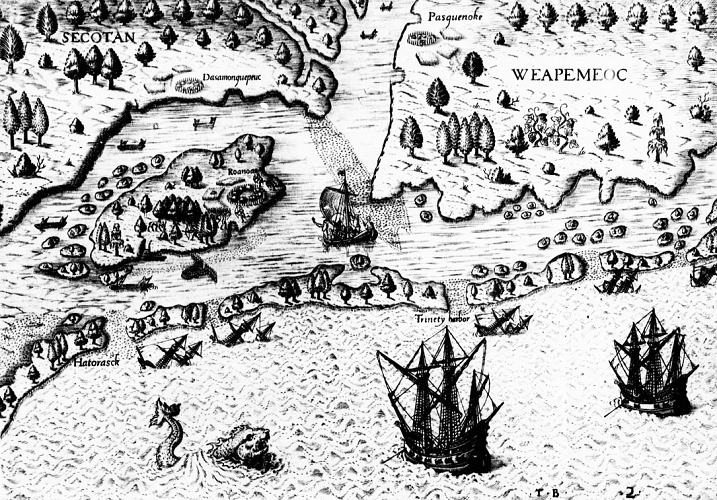Barlowe, Arthur
fl. 1584
 Arthur Barlowe, explorer, is remembered today for his entertaining report to Sir Walter Raleigh describing the experiences of the 1584 Virginia expedition, of which he was a member. This report has been called "one of the clearest contemporary pictures of the contact of Europeans with North American Indians." In his narrative, Barlowe describes the four-month expedition (27 Apr. to mid-September 1584) in glowing terms. The savages are "most gentle, loving and faithfull, void of all guile, and treason, and such as lived after the manner of the golden age." A detailed picture of their generous hospitality is given, as well as the manner of making boats, warfare among the tribes, and the type of food grown and its preparation. The soil was the "most plentifull, sweete, fruitfull, and wholsome of all the world," and English peas planted by the voyagers grew fourteen inches in ten days. There are omissions in Barlowe's report, however, and it is thought that the omitted material was suppressed deliberately, for propaganda purposes.
Arthur Barlowe, explorer, is remembered today for his entertaining report to Sir Walter Raleigh describing the experiences of the 1584 Virginia expedition, of which he was a member. This report has been called "one of the clearest contemporary pictures of the contact of Europeans with North American Indians." In his narrative, Barlowe describes the four-month expedition (27 Apr. to mid-September 1584) in glowing terms. The savages are "most gentle, loving and faithfull, void of all guile, and treason, and such as lived after the manner of the golden age." A detailed picture of their generous hospitality is given, as well as the manner of making boats, warfare among the tribes, and the type of food grown and its preparation. The soil was the "most plentifull, sweete, fruitfull, and wholsome of all the world," and English peas planted by the voyagers grew fourteen inches in ten days. There are omissions in Barlowe's report, however, and it is thought that the omitted material was suppressed deliberately, for propaganda purposes.
Nothing is known of Barlowe personally except that, like Philip Amadas, he was part of Raleigh's household in his early years. On the Virginia expedition he was second captain to Amadas and accompanied him on the visit to Chief Wingina's village on Roanoke Island. On the return to England in September, they took with them two Indians, Manteo and Wanchese, who were taught English and served as propaganda agents for a second voyage.
There is no certain evidence that Barlowe returned to Virginia on the 1585 expedition, although Amadas did. His name is listed only in the Holinshed account of the 1585 expedition, and that reference cannot be trusted. He is not listed in the Tiger journal, and, although it is possible that Barlowe kept the journal himself and forgot to include his own name, the report is not written in his style. Like his friend Amadas, Barlowe dropped out of sight after his return to England.
References:
John Aubrey, Brief Lives, ed. Andrew Clark, 2 vols. (1898).
Additional Resources:
David B. Quinn, ed., The Roanoke Voyages, 1584–1590, vol. 1 (1955).
Roanoke Colonies Illuminated, East Carolina Universities: http://digital.lib.ecu.edu/hakluyt/upload.aspx?p=Philip%20Amadas&type=note&from=hakluyt
Amadas and Barlowe, National Historic Site, Fort Raleigh, National Park Service: https://www.nps.gov/fora/forteachers/amadas-and-barlowe.htm
Barlowe, Arthur. The First Voyage Made To The Coasts Of America, With Two Barks, Wherein Were Captains M. Philip Amadas, And M. Arthur Barlowe, Who Discovered Part Of The Countrey Now Called Virginia Anno 1584. Written By One Of The Said Captaines, And Sent To Sir Walter Ralegh, Knight, At Whose Charge And Direction, The Said Voyage Was Set Forth. [Boston, Mass.]: [Directors of the Old South Work], [1898]. https://docsouth.unc.edu/nc/barlowe/barlowe.html
"Amadas and Barlowe explore the Outer Banks." Prehistory, contact, and the Lost Colony. LearnNC.org. http://www.learnnc.org/lp/editions/nchist-twoworlds/1846 (accessed June 25, 2012).
Barlowe, Arthur. "Captain Arthur Barlowe's Narrative of the First Voyage to the Coasts of America" in Burrage, Henry S. (editor). Early English and French Voyages, Chiefly from Hakluyt, 1534-1608. New York: Charles Scribner's Sons, 1906. Pages 225-241. online facsimile edition at http://www.americanjourneys.org/aj-034/ (accessed June 25, 2012).
Image Credits:
De Bry, Theodor. Wunderbarliche, doch warhafftige Erklärung: von der Gelegenheit vnd Sitten der Wilden in Virginia. Frankfurt: Johann Wechsel. 1590. https://archive.org/stream/cihm_94737#page/n3/mode/2up
1 January 1979 | Shirley, John W.